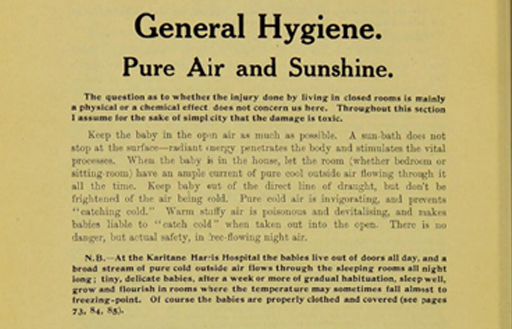2.1 Sleeping outdoors
The outdoors has long been considered as an ideal environment for babies to sleep in. For example, in Northern Finland, the cultural value families place on being outdoors in nature, means that sleeping outdoors, whether in the home or ECEC setting, is understood to be an important part of good childcare, similar to the narrative heard around breastfeeding elsewhere (Tourula et al., 2013). The practice of babies sleeping outside originated in public health concerns of many countries in the early twentieth century. There was an urgent need to prevent disease and therefore mothers were encouraged to let their babies sleep outside. This was because the outdoors was associated with fresh air, sunlight and good health.
One important proponent of this was Frederic Truby King (1858–1938). Truby King was a doctor and baby care guru, based in New Zealand. He wrote an internationally influential childcare manual called Feeding and Care of Baby (1913). Some of his views around routines and discipline have fallen out of favour and may appear very rigid and unkind to modern day parents. However, his views which encouraged parents (here the mother) to take their young child outdoors is echoed in present-day voices. His writing demonstrates how once this practice was seen as common. He argued that ‘the more a baby is out in the open air, the better he will thrive’ (1913, p. 92) and you can see a relevant page from his famous manual in Figure 2.
In a different context, the idea of thriving in the outdoors was also the thinking behind Margaret McMillan’s ‘baby camp’ set up in Deptford, London in 1914 for the youngest children from the London slums because of a ‘recognition that many working class homes were not capable of providing adequately for their young children’ (Read, 2012, p. 17). In present-day practice, Lin Day, the founder of Baby Sensory, argues that ‘Fresh air …can have a positive impact on brain function, mood and well-being’ (2019, p. 1), drawing evidence from research in biology and medicine to make this claim.

